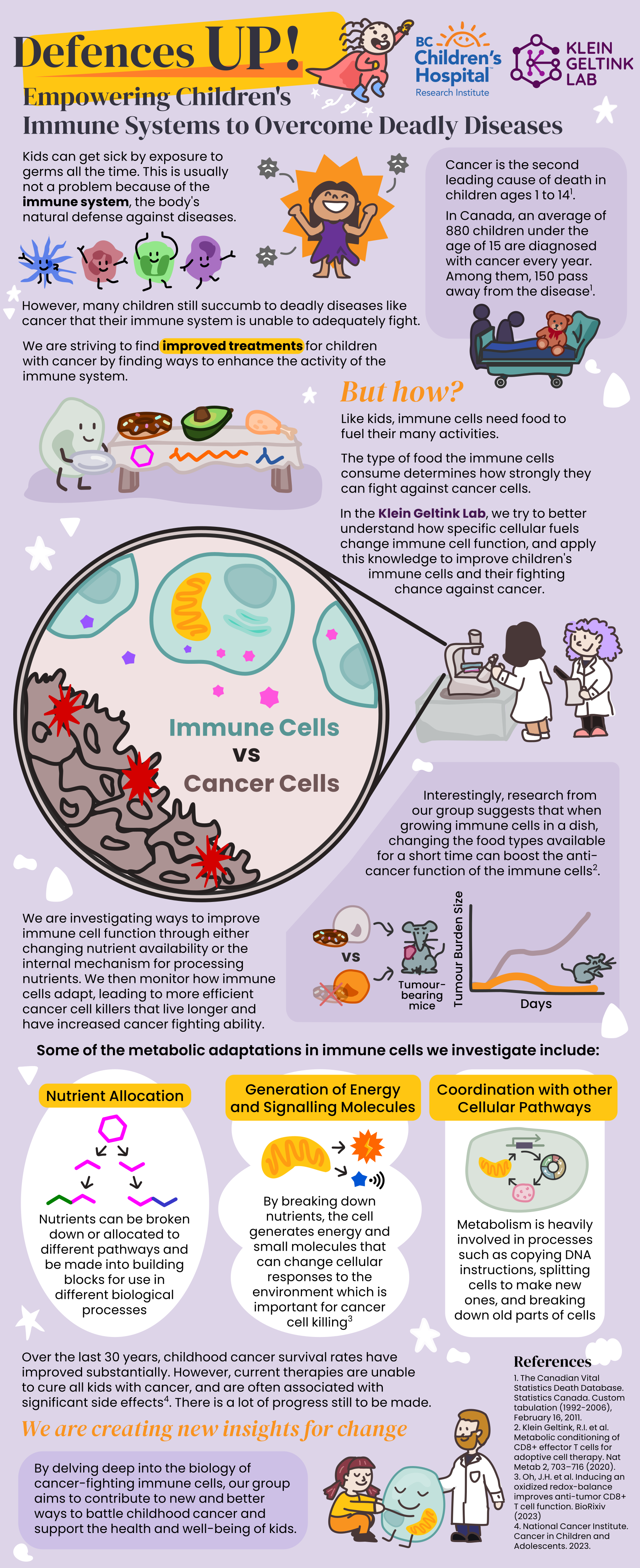
Klein Geltink, Ramon
PhD
Academic Rank(s): Assistant Professor, Pathology and Laboratory Medicine, UBC | Investigator, BC Children’s Hospital
Affiliation(s): BC Children’s and Women’s Hospital
Research and Scholarly Interests: Blood research, Cancer, Endocrinology, Metabolism & Nutrition
Clinical Interests:
I grew up in the east of the Netherlands, and obtained my Bachelors in biomedical sciences in Deventer, The Netherlands. I left the Netherlands in 2005 for my PhD training in molecular biology at St. Jude Children’s Research Hospital in Memphis, TN, USA, in Prof. Gerard Grosveld’s lab, in the department of Genetics, studying the role of mTOR signaling in tumorigenesis.
In 2015 I started my post-doctoral training in T cell metabolism at the Max Planck Institute in Freiburg, Germany in the department of Immunometabolism. I was trained by Prof. Erika Pearce, one of the world leaders and pioneers in the field of Immunometabolism.
In 2019 I was recruited to Vancouver to join the department of Pathology and Laboratory medicine and BCCHRI to start my own research program in immunometabolism. My research program at UBC/BCCHRI aims to characterize nutrient-sensing pathways in T cells. We use biochemical and metabolomic techniques to understand what fuel is needed for immune cell function, and how immune cells sense the fuel that is available in their environment.
By closely collaborating with Clinicians and Clinician scientists at BCCHR we are aiming to apply the findings to design better treatments for children with immune related diseases.
Outside of the lab I am a (very) amateur photography enthusiast, with a special interest in wildlife photography.
Academic Background
- PhD. Erasmus University, Rotterdam, The Netherlands. 2014
- BSc. Saxion Hogeschool Ijselland, Deventer,The Netherlands. 2002
Awards and Recognition
Publications
Selected Publications
Research Interest
My research program aims to better understand how the immune system can be used to treat childhood diseases. In children with cancer, the immune system is no longer able to rid the body of cancerous cells. In children with autoimmune diseases the immune system gets rid of healthy cells of the body. We are particularly interested in the metabolism of immune cells. Metabolism consists of all the chemical processes that occur within a living organism that maintain life. In immune cells, this means that building blocks (metabolites) need to be brought in to allow the duplication of a cell by making all crucial parts of new cells. In fast growing immune cells this is especially demanding, since they need to duplicate themselves very rapidly to protect against attacks on the normal function of our bodies by, for instance, infections or cancer. This requires a variety of building blocks, and a lot of energy. For this process, cells can acquire these building blocks from their environment, or make them via intricate biochemical pathways. When the right building blocks are not available, immune cells fail to increase in numbers and cannot perform their job.
We use biochemical and metabolomic techniques to understand what fuel is needed for immune cell function, and how immune cells sense the fuel that is available in their environment.
By closely collaborating with Clinicians and Clinician scientists at BCCHR we are aiming to apply the findings to design better treatments for children with immune related diseases.
Infographic: “Improving Children’s Immune Systems to Overcome Deadly Diseases”
Created for the CIHR competition. Click the image to view in larger size.
